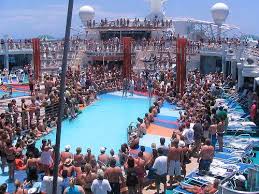Q – OK, we are now “fans” but one or two of your revelations about the travel industry seem to be so “first time I have ever heard that” off-the-charts. I just read a piece you had published suggesting that because I fly to Europe and Australia on business, I should be smearing my face with protective suntan lotion for up to fifteen hours at a time in the air. I do always prefer a window seat whether I am flying Economy Plus or Business. But I have never, ever seen a fellow passenger lather up. Not asking for a scientific treatise but wondering what led you to suggest this strategy. Wouldn’t I scare my fellow passengers if I get up covered with lotion, to use the restroom?
A – You might – but on a long flight with the sun streaming in through the windows mid-day, sun exposure is a credible risk that has been affecting pilots for years. The New York Times has reported on some of the abnormally high cancer rates pilots on longer routes have experienced.
We know that airplane windows are typically made of polycarbonate plastic or layered composite glass.While there is negligible transmission of UVB rays through plastic and glass windshields, UVA transmission through these windows is significant.”
It is thought that the heavy amount of light transmitting through airplane windows contain potentially-harmful UVA rays.
Why should you care? Well, though you won’t necessarily get a sunburn since that’s caused primarily by UVB radiation, UVA rays penetrate the deeper layers of skin and are known to cause photoaging (sun spots and wrinkling).
When you are flying at 33,000 feet one of the most remarkable characteristics of your flight is that you are, quite literally, flying above the atmosphere. But you are closer to the ozone layer by about six miles. You are that much closer to the sun so we can hopefully agree that the sun’s rays are, at that altitude, considerably more powerful. Added to that, is the fact thatyou are flying above weather- above clouds, that serve to filter some of the harmful rays from the sun .
The bottom line appears to be that flying long distances, particularly in an aisle seat with the shades left open, your exposure to UVA rays can contribute to the development of skin cancer.
And since you’re closer to the ozone layer — almost six miles closer to be more exact — the sun’s rays are simply more powerful. Plus, extended exposure to UVA rays can contribute to the development of skin cancers.
The Journal of the American Medical Association reported that the plane’s windows stopped about 99% of UVB rays, but only about half of UVA rays. That means about an hour of exposure on a plane is the equivalent of 20 minutes in a tanning bed. And, according to SkinCancer.org, there is no safe amount of time you should spend in a tanning bed.
We will continue to suggest that clients flying in a window seat on any flight of three hours or longer, apply protective amounts of high-quality suinscreen while keeping the window shades down as much as possible. It just makes sense. Family and friends in adjoining seats may want to do the same as UVA rays penetrate the aircraft’s structure.
We are not suggesting a full face two-inch lather of protective cream – just the same amount you might apply for a few hours At the beach. If you ever run into any professional pilots you may want to see what they have to say on the subject and the steps they take,m with so much window exposure, to protect themselves.
We will know we are making progress when Business and First Class Amenity Kits start containing small tubes of sunscreen.







